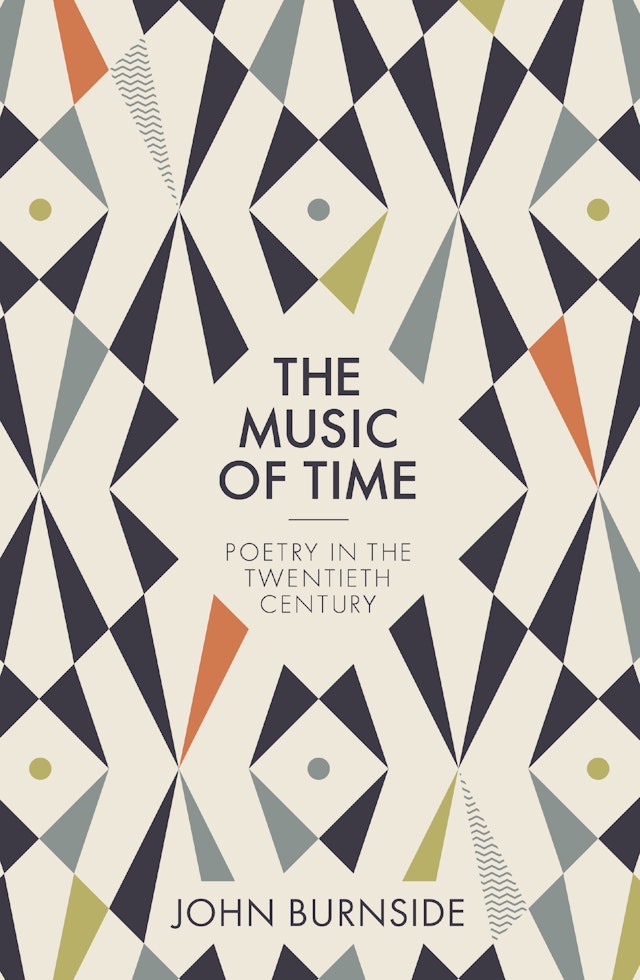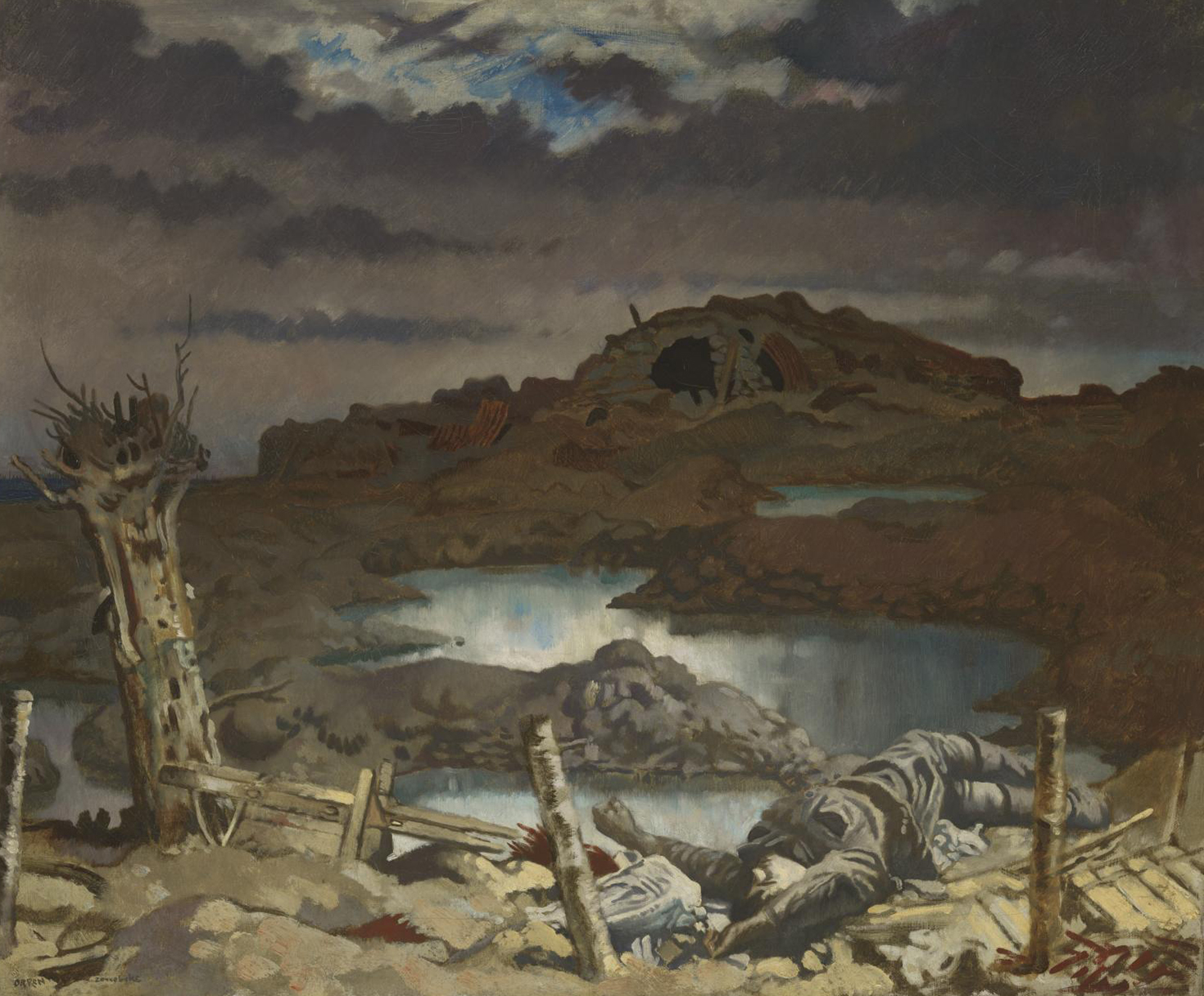
Zonnebeke, by William Orpen, 1918. Photograph © Tate (CC-BY-NC-ND 3.0).
For reasons that were left unexplained at the time, and which still trouble me now, the first poems I was given to read were “about” war. As a twelve-year-old, I assumed my teachers were right in assuming that their male charges were more disposed to battlefield heroics than, say, to romantic love. (It is possible that the education system has made no greater error than this casual eradication of the natural tenderness of boys, though some would argue that the system knows exactly what it is doing.) So it was that we studied literature in which the horrors and even the futility of war might be depicted, but our guided readings never went quite so far as to suggest that peace was an absolute good while war was to be avoided under any circumstances. The message was overtly pacifist, but the underlying currents were equivocal. Every shrill, demented choir of wailing shells was matched by the six hundred, riding bravely into the Valley of Death, to do and die and, should the times require it, be emulated. Every expression of contempt for the “incompetent swine” behind the front lines was outweighed by some beau geste of desperate heroism.
Even with Jesus peering over their shoulders, our elders could reserve for a later date the expediency that war, however repellent, was sometimes necessary and, when it was, good men were obliged to dig deep and find an unaccustomed ferocity in their hearts. Gradually, however, as the 1960s slowly caught up to my industrial Midlands backwater, the scales began to tip toward a tacit dismissal of the First World War poets, not only for pacifist but also for class reasons. No matter how well they depicted the pity and sorrow of that conflict, the poets themselves were still touched with the silvery, almost cinematic glow of unearned luck; even in death they were darkly privileged, oddly clean amid all the squalor. Those deaths were tragic, but it was their tragedy, not ours. For me, the pivotal moment came when, called upon to recite Rupert Brooke’s “The Soldier” at a Remembrance Day assembly, I tried instead to read “Does It Matter?” by Siegfried Sassoon, managing to get as far as the lines
Does it matter?—losing your sight?
There’s such splendid work for the blind;
And people will always be kind
before I was interrupted by the kindly music teacher, who tried to pass my petty rebellion off as a bookmarking error. It might seem odd now that, more than Wilfred Owen, more than my fellow Scot Charles Hamilton Sorley, the writer my working-class teen self was most drawn to among the First World War poets was the wealthy and undeniably snobbish Siegfried Sassoon, but there was something about his approach—the bitterness, the pungency, the satiric bite, reminiscent of Swift—that caught my attention from the first. It was purely a matter of taste and background, I know, but I much preferred Sassoon’s work to Owen’s poetry of pity, as seen in “Dulce et Decorum Est” or “Anthem for Doomed Youth.”
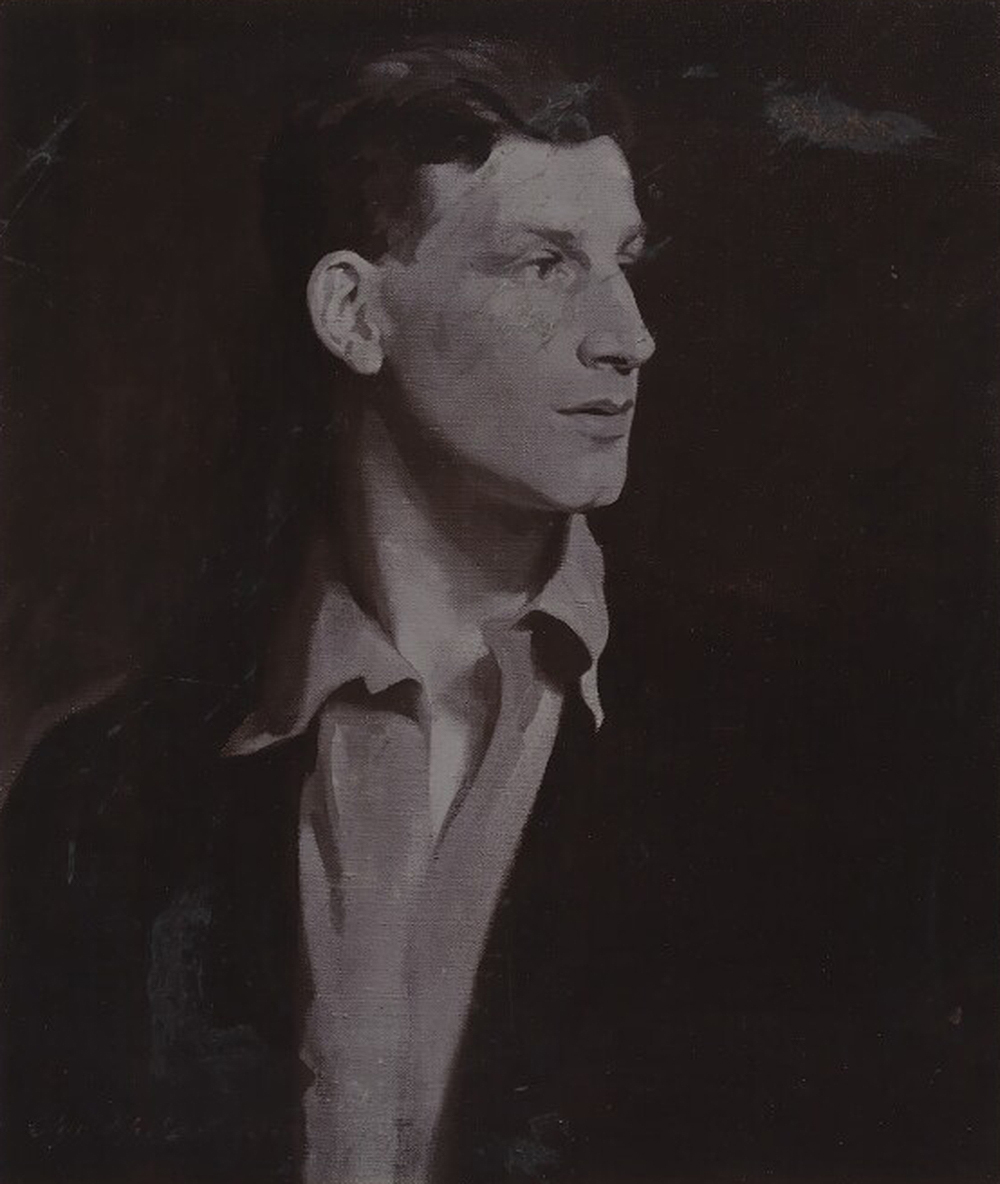
I can admit now to a certain youthful arrogance, but for me, all too often, Owen’s dramatis personae were smaller than life. By contrast, reading Robert Lowell’s “For the Union Dead,” I recognized a larger truth in the portrait given there of Colonel Robert Gould Shaw (the white commander of the all-black 54th Massachusetts regiment) killed at Fort Wagner, near Charleston, South Carolina, in 1863, whom the poet describes as having
an angry wrenlike vigilance,
a greyhound’s gentle tautness;
he seems to wince at pleasure,
and suffocate for privacy.
He is out of bounds now.
He rejoices in man’s lovely,
peculiar power to choose life and die.
That was a different war, of course: a struggle that, like World War II, could lay claim to a moral purpose. The main problem for a non-English working-class reader was the simplistic but rather persuasive argument that, from the point of view of the mass of people, the First World War had been a cynical dispute between two sets of imperial powers over resources and colonial dominion—and nobody came to see this, and to express it with such raw power, as Sassoon did, not just in his poetry but also in his public life. Here, for example, is his much-publicized “A Soldier’s Declaration,” written on June 15, 1917, and published in the Bradford Pioneer, decrying the mismanagement of the war and the consequent suffering of the men at the front:
I am making this statement as an act of willful defiance of military authority, because I believe that the war is being deliberately prolonged by those who have the power to end it. I am a soldier, convinced that I am acting on behalf of soldiers. I believe that this war, upon which I entered as a war of defense and liberation, has now become a war of aggression and conquest. I believe that the purposes for which I and my fellow soldiers entered upon this war should have been so clearly stated as to have made it impossible to change them, and that, had this been done, the objects which actuated us would now be attainable by negotiation.
I have seen and endured the sufferings of the troops, and I can no longer be a party to prolong these sufferings for ends which I believe to be evil and unjust.
I am not protesting against the conduct of the war, but against the political errors and insecurities for which the fighting men are being sacrificed.
On behalf of those who are suffering now I make this protest against the deception which is being practiced on them; also I believe that I may help to destroy the callous complacence with which the majority of those at home regard the continuance of agonies which they do not share, and which they have not sufficient imagination to realize.
Sassoon took a personal risk by making this declaration, and it was only the timely intervention of well-connected friends such as Robert Graves that prevented his being court-martialed. Instead, he was sent to Craiglockhart, where new methods in treating shell shock were being developed. Here he continued to create a poetry that, while paying tribute to the bravery and camaraderie of his fellow soldiers, also exposed the arrogance and disdain for other lives among the powers-that-be. He was prepared both to be forthright in his judgments and to apportion blame. Here he is in “Base Details” lambasting those who daily fed Owen’s doomed youth to the cannons without a moment’s remorse:
If I were fierce, and bald, and short of breath
I’d live with scarlet Majors at the Base,
And speed glum heroes up the line to death.
You’d see me with my puffy petulant face,
Guzzling and gulping in the best hotel,
Reading the Roll of Honour. “Poor young chap,”
I’d say—“I used to know his father well;
Yes, we’ve lost heavily in this last scrap.”
And when the war is done and youth stone dead,
I’d toddle safely home and die—in bed.
The verse form Sassoon chooses to use is regular, almost plodding and obvious (see how artlessly the punch line is set up, for example), but that isn’t because he is not capable of something more elaborate. On the contrary, form is matched to the capabilities of its subject—that is, to the “scarlet Major” back at base, whose grasp of literary style is unlikely to be any more sophisticated than his understanding of battlefield strategy. As one who had begun the war as a genuine instance of the scholar-warrior, for whom honor and personal responsibility were paramount, Sassoon rightly despised these men—and his contempt for them is expressed not just in what he says about them but in the way he spells it out, in the most basic and predictable form possible, so that they might understand.
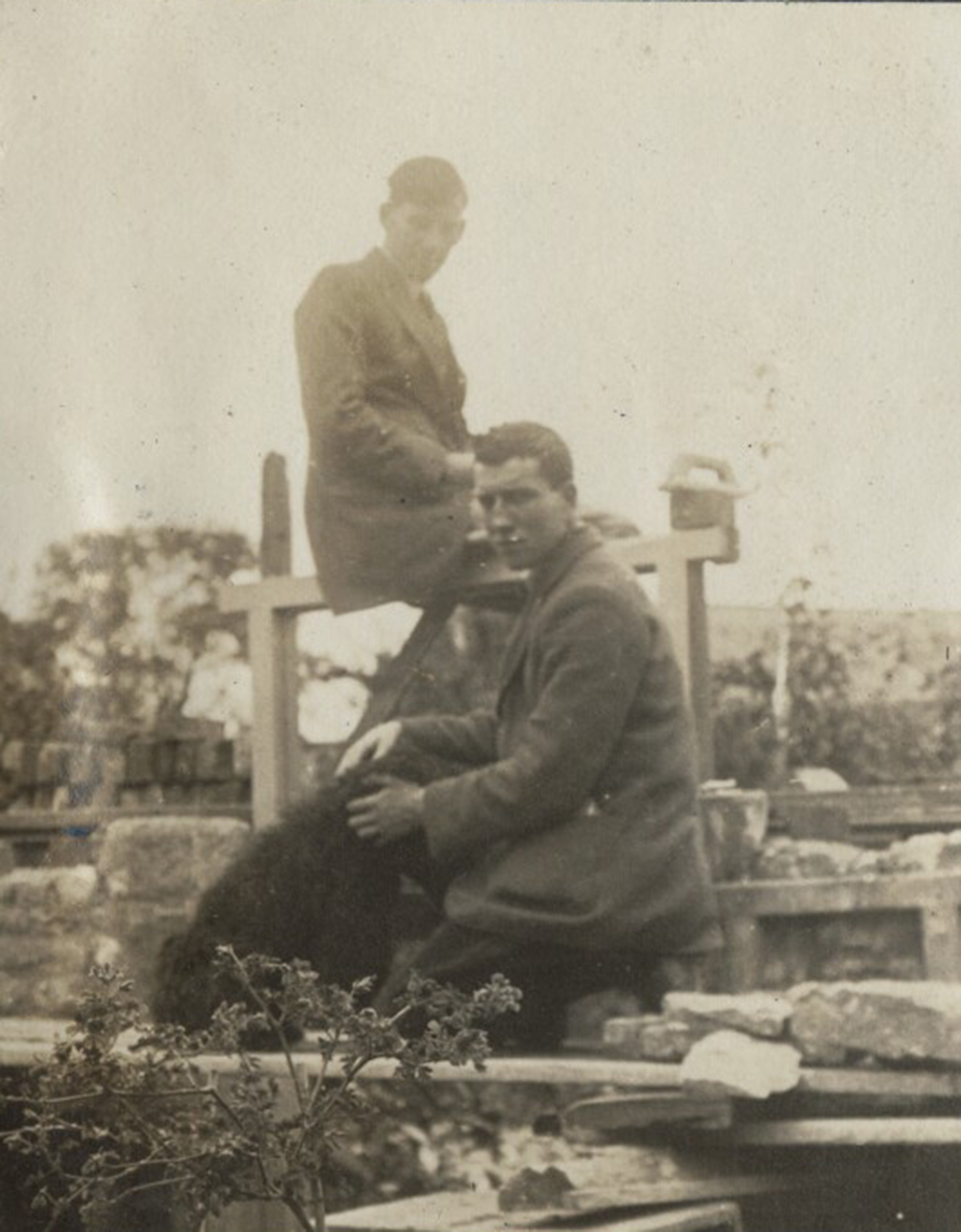
Sassoon does not confine his critique to incompetent senior officers and hypocritical politicians, however. He also takes aim not only at the “smug faced crowds…Who cheer when soldier lads march by,” or the cant of churchmen spouting hackneyed nonsense about the enemy as Antichrist, but also at the banal gossip he finds “On Reading the War Diary of a Defunct Ambassador”:
The world can read the rumors that you gleaned
From various Fronts; the well-known Names you met;
Each conference you attended and convened;
And (at appropriate moments) what you ate.
Thus (if the world’s acute) it can derive
Your self, exact, uncensored, and alive.
The world will find no pity in your pages;
No exercise of spirit worthy of mention;
Only a public-funeral grief-convention;
And all the circumspection of the ages.
But I, for one, am grateful, overjoyed,
And unindignant that your punctual pen
Should have been so constructively employed
In manifesting to unprivileged men
The visionless officialized fatuity
That once kept Europe safe for Perpetuity.
He also finds time to expose the hypocrisy of the women at home who perpetuate the unrealistic mythology of war, ready to support anyone who is suitably heroic or, if wounded, suitably gracious about it.
You love us when we’re heroes, home on leave,
Or wounded in a mentionable place.
You worship decorations; you believe
That chivalry redeems the war’s disgrace.
You make us shells. You listen with delight,
By tales of dirt and danger fondly thrilled.
You crown our distant ardors while we fight,
And mourn our laureled memories when we’re killed.
You can’t believe that British troops “retire”
When hell’s last horror breaks them, and they run,
Trampling the terrible corpses—blind with blood.
It is an area where other poets, even those who are most critical of the system, fear to tread—and it comes almost as a shock when we notice the bitter ambiguity of the fifth line’s “You make us shells,” or the disdain the speaker shows for those who “worship decorations” and willfully blind themselves to the horrors of war in their determination to perpetuate a myth of romantic chivalry.
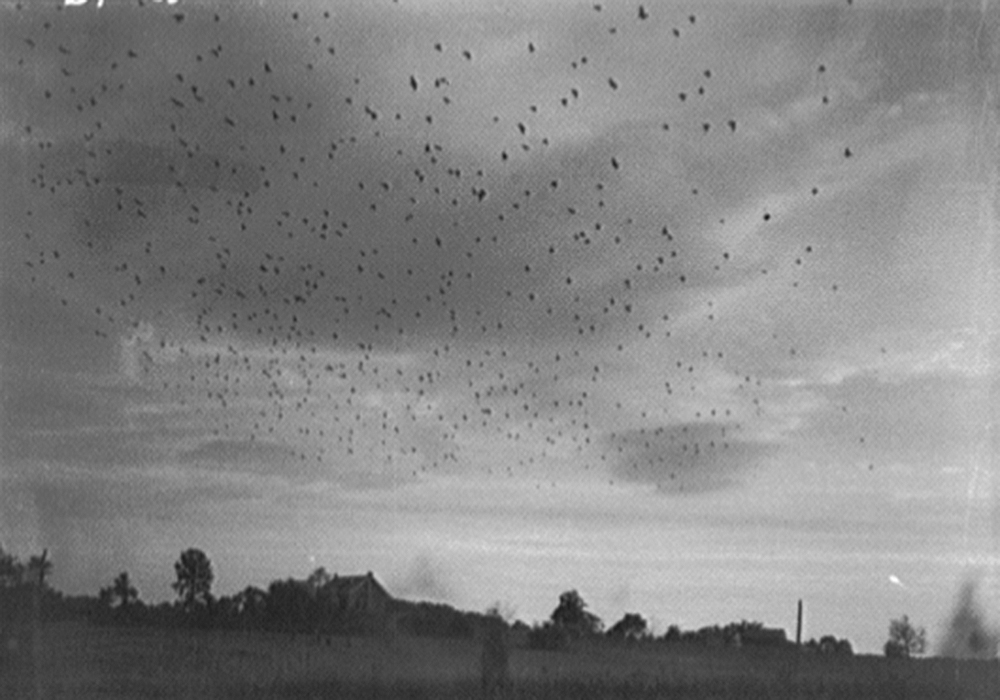
There is, however, more to Sassoon than a satirical gift worthy of Swift—and the poem of his that I most love, “Everyone Sang,” might not be a war poem at all. It might even be that rare thing, a peace poem. It begins with an unexplained outburst, in which the most powerful element is the impromptu choir’s improbable, even miraculous, synchronicity:
Everyone suddenly burst out singing.
This is an astonishing, arresting moment, and we might be tempted to charge Sassoon with having a personal epiphany here. But there is no Romantic ego at the center of this experience; instead, the speaker, who is throughout a spectator at the spontaneous chorus, is
filled with such delight
As prisoned birds must find in freedom,
Winging wildly across the white
Orchards and dark-green fields
and the image Sassoon chooses to convey that sudden sense of freedom is, like the singing, a communal one—not a single bird that rises, suddenly liberated, into a blue sky, but an entire flock of flesh-and-blood and hollow-boned creatures. The underlying suggestion, it seems to me, is that all must be able to fly free for freedom to be considered freedom. What should also be noted is that the image does not stay; the freed birds do not linger to act as emblems or signs for the speaker’s emotional state, they just fly
on—on—and out of sight
as real, mortal birds would. In short, having been freed, they
vanish into their own world, becoming invisible in ours.
Now “everyone” sings. And who is this everyone? A group of soldiers celebrating the announcement of the Armistice? An entire village back home or even England itself, raising its voice in hope, now that the horror of years is drifting away? In a real sense, it does not matter—in another it is, and should be, all of these things; for one unguarded moment, what matters is the spontaneity of the people, matched by a powerful sense of common cause:
Everyone’s voice was suddenly lifted;
And beauty came like the setting sun.
The poem is a wonderful, seemingly simple (indeed, brilliantly artless-seeming) expression of an important truth, one often overlooked by the “executives” of Auden’s Yeats memorial: the enduring fact that community cannot be constructed, but can only emerge spontaneously from events, and when it does, even though the heart is still “shaken with tears,” and horror only drifts gradually away, what results, even if it lasts only a short time, is a birdlike freedom for everyone
O, but Everyone
Was a bird.
And the song is open to everyone because it is wordless—not a jingoistic recruiting song or a wail of national angst, or even one of those suspect anthems in which well-meaning Romantics call for universal brotherhood—and so is both purely musical and eternal for the only reason anything can be eternal: because it can never
be finished—and the song was wordless; the singing will never be done.
Sassoon allows the emotion to spill over, stretching his lyric form to breaking point and, in the process, extending and strengthening it. But the emotion that almost bursts the dam here does not come across as staged, or personal; it is shared—it is a response in the old, quasi-religious sense, and it happens at the very cusp of participation. (One feels, without being told as much, that, having put down his burden of tears and horrors, the speaker is just about to join this chorus, perhaps for the first time.) However, it is the overall sense of participation that matters, even more than the individual liberation, in making this a great poem of peace, rather than a momentary and entirely personal epiphany that does little to challenge the mortal fascination of war.
Excerpted from The Music of Time: Poetry in the Twentieth Century by John Burnside. Copyright © 2020 by John Burnside. Published by Princeton University Press. Reprinted by permission.
